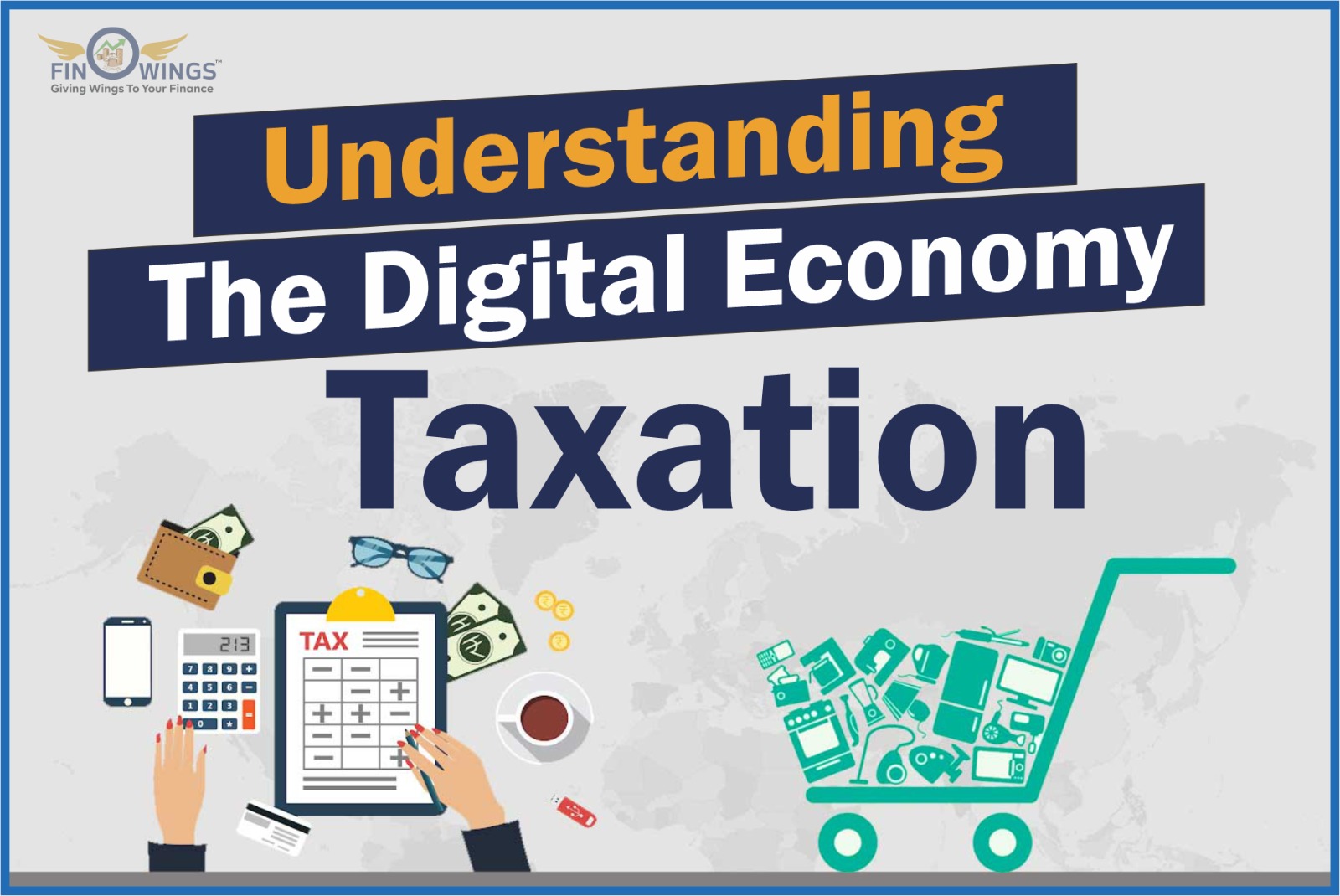Home >> Blog >> Understanding the Digital Economy Taxation
Understanding the Digital Economy Taxation

Table of Contents
Introduction
The tax concept has been revised over time to adapt to the rapid changes and developments in the Indian economic system. The business enterprises and companies operate in several tax jurisdictions and their incomes are taxable in all of them, but various concepts have emerged in order to develop clarity in law and order and decrease the chances of double taxation. Such concepts aim not only to create predictability for taxpayers, but also to balance the conflicting interests of developed and developing countries around the world. Additionally, certain jurisdictions offer various tax rebates, relief and incentives that help taxpayers to keep decrease their tax portions.
Proper taxation of income generated from the nation and its resources is essential for the economic growth of a country. A framework to ensure fair taxation has become more and more crucial for businesses using digital business models and making money without having a physical presence in India. Internet advertising is growing rapidly in the recent times in both revenue and share of the overall advertising market.
Meaning
The digital economy is the section of the economy that is driven by the billions of daily interactions that occur online between individuals, businesses, devices, data, and processes. Hyperconnectivity, or the increased interconnectivity of people, organisations, and machines as a result of the Internet, mobile technology, and the internet of things, are the foundation of the digital economy.
As the digital economy takes shape, it is challenging long-held beliefs about how businesses are managed, how they operate together, and how consumers access goods, services, and information.
The Internet also provides taxpayers with access to new sources of income through virtual transactions. These transactions can be completed in the form of "real money" or virtual currency. In many cases, the tax effects of these transactions are not identified and recorded as income tax or GST.
This article briefly discusses the scale of the digital economy and the challenges individuals face in achieving full tax compliance.
Objectives
The primary purpose of this study is to identify the tax knowledge of individuals working in the digital economy and classify these requirements as general, procedural or legal. A second objective is to identify risk areas related to these knowledge requirements that may hinder tax compliance of the individual taxpayer. Recognizing these risk areas will help the tax authorities to develop targeted strategies and improve knowledge of taxpayer of the digital economy at various levels.
Need of Digital Tax
It is difficult to bring these new business models under the domestic taxation of the source country's radar because they heavily rely on intellectual property assets, frequently found in low-tax jurisdictions and have the potential to generate enormous revenues through highly engaged remote or digital user participation from the domestic market. The subject of digital service tax (DST) plays a very vital role at this juncture.
DST refers to tax collected on revenue generated by providing digital financial services and has not been defined in any domestic or international law and treaty.
Businesses can conduct their operations with a little physical presence owing to the technology's growing adoption, advancement, and improvement. Additionally, the global COVID-19 pandemic has driven traditional firms to transition from traditional to digital or remote forms of operations and revenue production in general. This has helped even traditional enterprises overcome their apprehension regarding remote operations. The complexity from a tax and regulatory perspective has increased as a result of this enormous digitization of company models.
In order to take advantage of the chance to play a significant role in the global expansion of the digital economy, the Indian taxation structure and framework must also be modified in accordance with the new technology.
Background
The concept of a permanent establishment has been fundamentally changed with the advent of digitization. The United Nations (UN), United States (USA), and Organization for Economic Co-operation and Development (OECD) models all have been used as tools to establish financial sovereignty in international economic activity, including multinational corporations. The definition of a prospective permanent establishment is becoming vaguer as the digital economy grows like the world’s largest taxi company, it owns no cars, we all know it - Uber. Today, companies don’t need to own even a single asset, but they are economically viable to function around the world.
The introduction of a countervailing tax in 2016 has seen significant changes in digital taxation in India. Base Erosion and Profit Shifting (BEPS) is an Organization for Economic Co-operation and Development (OECD) initiative to tax the e-commerce activities. “Equalization Tax” was introduced in the Finance Act 2016. The Equalization Tax was the result of proposals from the Central Board for Direct Taxes (CBDT), Revenue Department and the Finance Ministry of India.
The OECD Committee's proposal has been implemented by the government and a new chapter has been added to the Finance Act 2016. The Equalization Levy is defined in Section 164(d) of the Finance Act 2016 as “equalisation levy” is the tax levied on consideration received or payable for any specified service or e-commerce supply or services under the requirements of this Chapter. This tax was imposed only on online advertising, as the GOI has not yet notified any services outside the scope of this chapter.
Despite the Committee's recommendation that the above definition include a wide range of services, the government only mandated that it apply to digital advertising instead. It is set at the tax rate of 6% and the value of the item is above Rs. 100,000. Currently, it only applies to services provided by non-resident Indians when doing business with residents in India. By amending the Finance Act 2016, the government plans to extend the application of the equalisation levy in 2020.
Almost all digital e-commerce transactions in India will be taxable with the introduction of equalisation levy on 1st April 2020. A non-Indian doing business with a resident of India is subject to 2% charge on the amount of consideration received through e-commerce transaction.
Implementation
While the OECD seeks to reach agreement on an inclusive framework to resolve tax issues related to digitization, certain countries have taken unilateral actions toward taxing the digital economy. India adopted a new equalisation levy on non-residents' income from online advertising and related services in 2016.
SEP was introduced in 2019 by way of amendment in the Indian tax law. India's government postponed the implementation despite the Finance Act 2020 was passed, citing a lack of efficient processes under the nation's foreign tax treaties. The Union Budget 2020–21 guidelines did not originally include an Equalization Levy on the sales of goods and services made in India by foreign e-commerce businesses. Since its implementation on January 1, 2020, this tax has been used to cover for a variety of costs. India's digital economy would experience both positive and negative repercussions as a result of the equalisation levy. Therefore, it is crucial to comprehend both of these factors and determine whether such a radical change in India is necessary at this time.
Implication
A few implications of the recent tax changes in India are as follows:
-
Equalization Levy:
In India, an equalisation levy was put into place in 2016, and it imposes a 6% tax on any revenue generated from the sale of online services by non-Indian residents to Indian taxpayers who are operating a business. According to this, international businesses must now obtain a PAN number in order to function and file returns in India. It covers the general sale of products and services to Indian taxpayers or residents by individuals or businesses that are generally not Indian residents.
-
Significant Economic Presence (SEP):
The SEP concept was first introduced in India in 2018, and it has been reported that SEP will be put into effect in May 2021. According to the SEP regulations, non-residents of India who engage in financial or commercial operations in India that exceed the required revenue or user-linked levels will be considered to have a taxable presence in the Indian region due to the existence of an economic nexus.
-
Withholding tax on e-commerce transactions:
In e-commerce transactions, there is a withholding tax that is paid by the parties paying the money rather than the money's recipient to the Indian government. As a result, the tax is withheld and subtracted from the recipient's due income. One of the coordinated efforts toward the updated digital taxation model is the equalisation levy, together with the SEP rule and withholding taxes. The goal is to bring digital behemoths within the local taxation system's jurisdiction. Now, businesses with a digital presence but no permanent presence in India fall within the purview of the local tax’s jurisdiction in India.
The way forward
Considering how digital taxes can affect the business models of the organisations that are offering considerable value globally during the current pandemic outbreak, policymakers may want to re-evaluate the situation.
India has made it quite clear that it will stop at nothing to tax earnings that are derived in India, and it is counting on the inherent economic advantage of having a large customer base in its quest to tax the digital economy through unilateral measures.
Due to this, international e-commerce transactions were subject to the equalisation levy. To ensure a level playing field for both, it appears that start-ups and mid-sized businesses—who actually bear the brunt of the tax burden—will be struck harder than more established local and international e-commerce companies. Companies are being forced to reconsider their business models as a result of the Google Tax and the equalisation levy. The Digital Tax will surely have an effect on e-commerce and the technology sector, but it is uncertain how it would affect businesses that use digitally incorporated components in non-digital items.
The government must continue to take a leading role in identifying answers to issues if it is to win back public support for treating multinational firms fairly. Governments' adoption of unilateral actions that might contravene already-existing trade agreements has some people incensed. It's made worse by the lack of knowledge on topics like the type of organisation affected by digital taxes or how to more evenly distribute taxable income. Since they think the current restrictions need to be changed, nations cannot unilaterally tax foreign firms. Despite the challenges, the government's decision to implement the equalisation tax may be considered as a key step in its effort to gain control over and funding from India's digital economy.

















